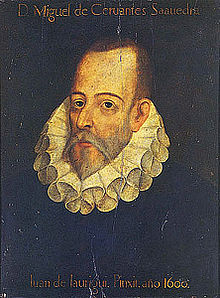 There has been a lot of reporting on some recent scholarship by historian Julio Mayo that finds that Cervantes, author of Don Quixote along with a bunch of stuff you’ve probably never heard of, had a relative that was British. There are two ways to look at this. First, it’s interesting because we know so very little about Cervantes. Second, it is not interesting because Cervantes’ lineage is not interesting.
There has been a lot of reporting on some recent scholarship by historian Julio Mayo that finds that Cervantes, author of Don Quixote along with a bunch of stuff you’ve probably never heard of, had a relative that was British. There are two ways to look at this. First, it’s interesting because we know so very little about Cervantes. Second, it is not interesting because Cervantes’ lineage is not interesting.
The whole thing has to do with the an English family of traders, the Timtams. They apparently moved from England to southern Spain in 1480. As early as 1481, John Tintam was involved with the slave trade between Guinea and Spain. Now I know, Tintam and Timtam are not the same words, but that is the way it was at that time — spelling was all over the place and people often spelled their own names in different ways. Anyway, Tintam was the father or grandfather of Juan Titon de Cervantes. Is this Cervantes’ father’s father, Juan de Cervantes?
It is possible. However, since Cervantes’ paternal grandfather had a brother who was mayor of Cabra, the family was so integrated, and thus bred, into Spanish culture, that I have a hard time thinking much of this great English connection. Ultimately, we are all related. But more than that, people moved around a lot in the 15th and 16th centuries. There was a lot of breeding of people from different areas. And that brings up the whole “So what?” factor in this story.
I’m worried that the reason people are interested in this is to take away some of the Spanish of Cervantes — that there is an implication that a “pure” Spaniard could never have written such great books. But if only he had some of the magic dust from the island of Shakespeare, well then, it is all explained. The truth is that Cervantes was very much a Spaniard. In fact, it’s a bit disturbing at times to read his thoughts on the matter. What’s more, he tried to join the Spanish Armada, but was refused service (due to his lost hand, as I recall).
But there’s something else here. Throughout his life, Cervantes wanted to be a poet. But he was never successful at this. And the reason is that Cervantes wasn’t a very good writer on the micro-scale. What makes Don Quixote great is not the fine writing. It is first and foremost that he is a funny guy — the early 17th century Terry Pratchett. And the reason that we think him great today is because in those two novels he created the blueprint for both the modern and the postmodern novel.
Certainly others had written long books before. In fact, people had written long and funny books, like Rabelais’ Gargantua and Pantagruel series. But Don Quixote is remarkable in a number of ways. First, the characterizations are much deeper than anything ever seen; Don Quixote and Sancho Panza seem like real people. Second, the books actually go somewhere — they have narrative arcs. Other books were just much more like real life: this happened, then that happened, then another thing happened. Don Quixote pulls all that together and comes to a satisfying ending.
I think that Cervantes stumbled upon greatness because he was rather bad at the kind of writing that was popular at the time. Don Quixote was not the first “novel” that he wrote. It was just the one were he happened upon something new: two glorious characters who propelled his story to greatness. Exactly how Rodrigo and Leonor Cervantes came to produce the great writer is only marginally interesting and of no relevance at all.

 Matt Bruenig brought my attention to something,
Matt Bruenig brought my attention to something,